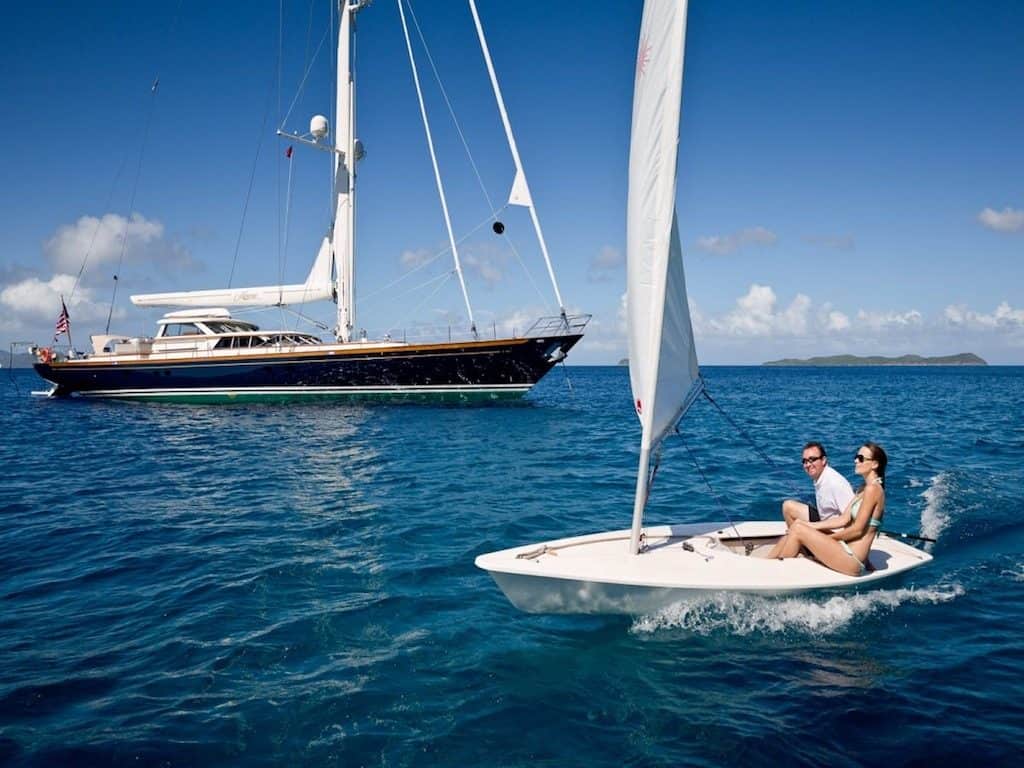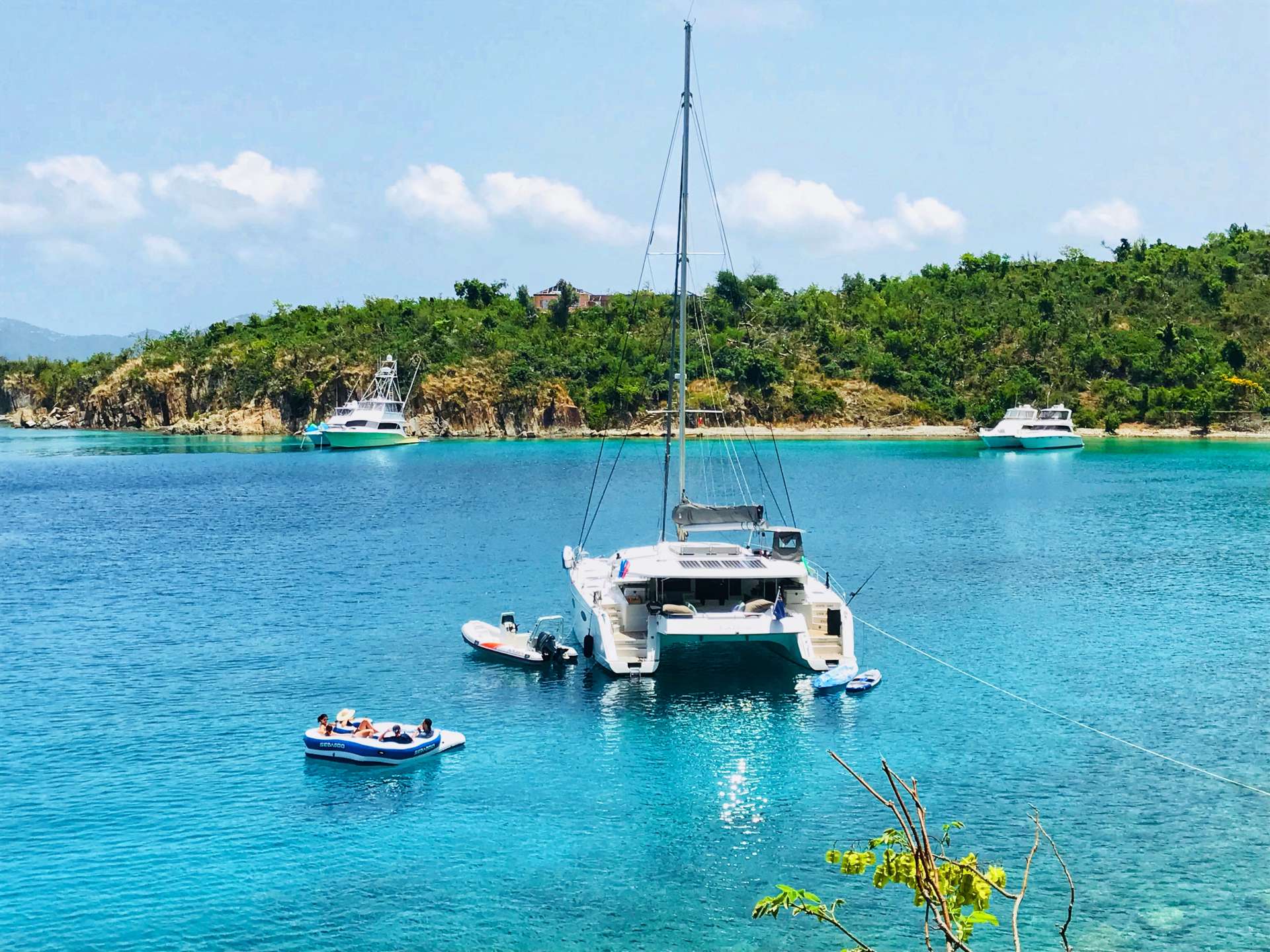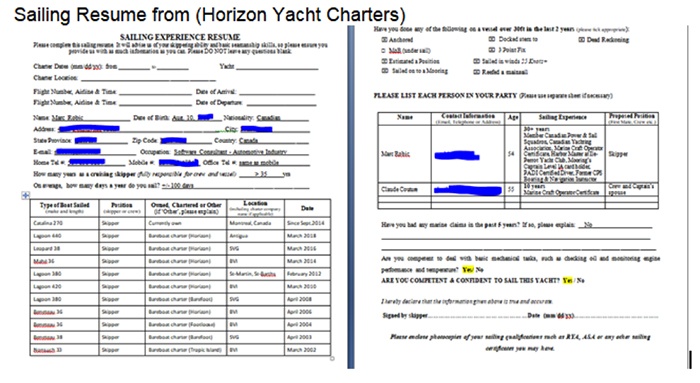Bareboat Chartering for First Timers
If chartering is something you’ve been dreaming about, this 3-part article is really for you and I hope will encourage you to give it a try… BUT be forewarned…it can be addictive!
I’ve been bareboat chartering in the Caribbean for over 3 decades every 2 or 3 years, during the last 17 years with my First Mate Claude. Returning many times to some of our favourite islands, such as the British Virgin Islands (BVIs), St-Vincent and the Grenadines (SVG) and Grenada. We’ve also sailed to the dual island of St-Martin/Sint-Marteen, St-Barth, Antigua, Anguilla and a few US Virgin Islands.
Over this time, the boats, along with the charter companies have evolved by huge leaps by making the process more efficient. Local service and product providers have also evolved to help serve the charter companies and their guests.
From pre-ordering all the groceries and drink, to be delivered onboard prior to departure, to making sure the process of introducing you to your well equipped charter boat and performing very informative chart briefings, most charter companies do an excellent job.
But despite all of the charter companies’ well laid out processes, there is still much to prepare ahead of time. In our case, we hate leaving things to chance. So we start planning about 6-8 months before. Once we know where we want to go, we pick tentative dates that will be flexible enough to match with flight dates and times.
There are two types of chartering: “Bareboat” where you take full command of the boat, and “Crewed” where a Captain is onboard with you (he must be paid, fed and given a berth). Some Captains may also have a First Mate that acts as deck hand, cook and tour guide. There are also sailboats and motor boats.
It is also important to note that most charter companies take extremely good care of their fleet with scheduled regular maintenance and haul-outs. So, do not be deterred from chartering an older boat and safe some money at the same time.
For the sake of this article, I will focus on bareboat chartering and sailboats which are what we always do. But most of the advice will apply to whichever type you dream of doing. I will also focus on Caribbean destinations.
Where to go
Each region, worldwide, is classified based on level of experience needed to rent a bareboat in their respective waters. Most of the Caribbean is classified as Level 1 (easiest, line of sight navigation) to Level 3 (more experience required with longer more exposed distances between anchorages).
For first timers of any experience level, I recommend selecting a Level 1 location, such as the BVIs (British Virgin Islands). All sailing is within eyesight of land, most bays and anchorages are extremely safe and secure, many offering mooring balls if you prefer not to anchor.
Every island caters to the charter industry, so you and your guest/passengers will feel extremely safe anywhere in the BVIs. And NO, there are no real pirates, only pirate caves to explore.
The sailing is great, water super clear and warm, swimming and snorkeling amazing and every island offers up its unique charm, beach bars and restaurants. And the people are amazingly warm and welcoming. The BVIs are also a great destination for families with children.
The first thing I always recommend is to prepare (and maintain) a Sailing Resume. I do update mine after every charter and you will be required to fill one in or provide one. Some of the information asked will be:
• How many years have you been sailing or boating?
• How many times as Captain in charge?
• What size boats have you captained?
• Do you currently own a boat (what make, model and size)?
• How many times have you anchored?
• Can you do minor mechanical repairs if required?
• Have you ever had a boating accident?
• What other related skills or experience do you have?
Needless to say, you must answer these honestly. But remember, regardless of how little experience you have, the charter company WANTS to rent you the boat. You will be paying for insurance anyway, so there are no worries or reasons to exaggerate your experience. Imagine if something serious happens and they discover you lied about your experience!
In some cases, for first timers, the charter company may put a Captain on boat for a half or full day simply to confirm your ability. But that’s really not a bad thing, as the local knowledge he/she can share during that time, can be a great source of hidden gems or an upcoming current activity charter companies may not know about at time of chart briefing. Local knowledge is invaluable, especially for first timers in the area.
I remember one year, we met a local Captain working on another boat and he mentioned this amazing “Jump Up” beach party that was going on the next night in Leverick Bay on Virgin Gorda. We changed our itinerary in order to be there and it was one of the highlight evenings of that trip. Great music, dancing, food and drink. We still remember it fondly.
One important consideration is who will be going? If it’s just you and your First Mate, the choices and decisions will be easier. If you are going with another couple or friends, then decisions such as boat size, model, on board amenities and budget will have to be considered.
In our case, we always book a boat that will provide each couple their own head. So no one has to clear out their toiletries after each use and each couple uses ONLY their head! In our case, unless we are alone, we book catamarans, so each couple actually has their very own hull.
If one of the others is also an experienced sailor, they should provide a sailing resume as well. Most charter companies will consider the combined experience amongst all charter guests on board. I always include my wife’s experience anchoring and grabbing mooring balls, etc.
Now is the time to search and learn more about the BVIs. Charter company websites are a great source of detailed information. Many offering up recommended or suggested 5, 7, 10 or 14 days itineraries, allowing you and your guests to fully appreciate the most popular destinations with suggested activities along the way.
Besides all the electronics like chart plotters, all charter boats include paper charts and local cruising guides for the area, a great source of information to read while underway or sailing to the next anchorage.
We’ve used many charter companies over the years and have our own opinion of each one. Some are big, like the Sunsail, Moorings and Footloose (all the same company) and offer many onsite (base) amenities like hotel, pool, restaurant, bars etc.
Others, like Horizon Yacht Charters and BVI Yacht Charters offer basic services on base, which suits us fine, as our goal is not to stay on base, but get out and enjoy our charter asap (see below for bareboat charter companies servicing the BVIs).
For the last 17 years, we’ve used mostly Horizon and BVI, depending on destination, boat and date availability. Because we are repeat customers now, we do get some extra benefits, which we appreciate, such as repeat customer discount and free sleep aboard the night before our charter date. So, instead of going to a hotel for one night, we get to unpack and familiarize ourselves with the boat the day/night before.
Depending on how early we arrive, we may go do our own groceries that day as well. Definitely a run to the local liquor store is involved! All charter companies offer sleep aboard option at an additional cost, but do ask if you can have it for free. Most will be glad to do so.
Besides being mandatory, the pre-departure boat and chart briefing is an important and very informative meeting onboard your boat prior to leaving the dock (we’ll detail more about the briefing in Part 3).
Since we get in the day before, we try and arrange our briefing as early as possible, which normally allows us the opportunity to leave before the normal noon departure time. (*most charters are from noon to noon)
Getting there from Canada
Once you’ve decided on the destination, the charter company and dates, it is time to request a pre-booking reservation package. The charter company will email you the “package” which will include the contract with all options, cost and payment structure, as well as the sailing resume form.
At this point, you should have been looking at available flights to make sure dates work. Charter companies are well accustomed to moving dates up or down a day or two. So keep in touch with them until both flights and charter dates work.
We always book flights to arrive the day before and book return flights two or three days after the charter. We love staying at a hotel or resort to relax a few days before heading home. It makes getting off the boat more relaxing as you’re not rushing to the airport.
Also, if your departure flights or connections are delayed for any reason, there’s less stress. Charter companies will be tracking your flights and re-schedule the taxi driver accordingly and make arrangements for someone to greet you and bring you to your boat regardless of how late you get in. So, truly no worries.
We fly in from Montreal. For added flight flexibility, we book flights to St-Thomas (USVI), usually via Atlanta or Miami. We then take the passenger ferry from Charlotte Amalie harbour to Road Town harbour, Tortola (BVI). From there, you clear British Customs and most charter companies will have a dedicated taxi waiting to take you to the charter base.
Budgeting
A few paragraphs before I mentioned some items to considered, one of which is budget. If you are going with others, it is critical to the enjoyment of all parties, that the budget be realistic for everyone. If the cost of a monohull is best for all concerned, then let it be.
If the extra cost and comfort of a catamaran is more acceptable, then go with that. Just remember, you’ll be spending most of your time outside, sailing, swimming, snorkeling and enjoying all fresco dining and cocktails with friends and building great memories. Perhaps even discuss the next charter destination!
In Part 2, I’ll be going over the actual planning, from itinerary, activities, meal planning & how to manage day-to-day common expenses and budget onboard. I hope to be able to share or make available some templates my wife and I have created and have been using for many years. We’ll share other great sources of information that will keep you dreaming and planning your own Caribbean dream sailing vacation!
In Part 3, I’ll highlight the day to day activities of the charter with tricks and best practices to make the best of it for all. From the pre-departure boat and chart briefing to how to make sure any money issues are mitigated! Share some of our favourite places and anchorages and finally (sadly) the process of returning the boat.



